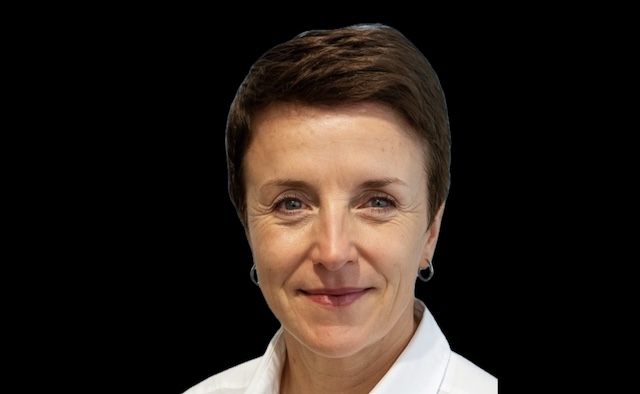🎙️Victoria Schooley Simon 🇫🇷 🇺🇸 | « Le marketing hôtelier n’est pas qu’un département créatif : c’est un levier stratégique »
Dans l’univers de l’hôtellerie, le marketing est souvent perçu comme un domaine centré sur l’esthétique et les visuels de marque. Mais selon l’experte internationale Victoria Schooley Simon, il est temps d’opérer un changement de regard. Dans un article éclairant intitulé "Marketing: More Than Just Pretty Pictures — A Strategic Engine for Hospitality", elle déconstruit les idées reçues et démontre comment le marketing — lorsqu’il est véritablement stratégique — devient un puissant levier de revenus, d’engagement client et de transformation de l’entreprise. Nous sommes partis à la rencontre de cette auteure récemment installée à Paris.

À la rencontre de Victoria Schooley Simon,
Auteure et spécialiste internationale du marketing hôtelier
🇫🇷 Désormais basée à Paris après une dizaine d’années en Californie, la franco-américaine Victoria Schooley Simon (The George Washington University, Master of Arts – MA, International Affairs | Duke University, Bachelor of Arts – Comparative Area Studies) est une experte internationale dans l’univers du tourisme, de l’hôtellerie et du loisir. « Naturellement » bilingue (français / anglais), elle conjugue une solide culture de marque à une expertise pointue en transformation digitale, marketing stratégique et gestion de projets complexes à l’échelle internationale. De Disneyland Paris à NBCUniversal, elle a dirigé pendant plus de vingt ans des initiatives d’envergure, au croisement de l’expérience client, de l’innovation digitale, et de la stratégie marketing..
🇬🇧 Now based in Paris after a decade in California, Victoria Schooley Simon (The George Washington University, Master of Arts – MA, International Affairs | Duke University, Bachelor of Arts – Comparative Area Studies) is an international expert in the fields of tourism, hospitality, and leisure. Bilingual (French/English) with a strong command of Italian, she combines a solid brand culture with deep expertise in digital transformation, strategic marketing, and the management of complex international projects. From Disneyland Paris to NBCUniversal, she has led major initiatives for over twenty years at the intersection of customer experience, digital innovation, and marketing strategy.
🇫🇷 À l’occasion de la sortie de son dernier article « Marketing: More Than Just Pretty Pictures » (lire en bas de page ⤵︎), Victoria Schooley Simon, spécialiste internationale en stratégie marketing dans l’hôtellerie haut de gamme, partage avec La Tribune de l’Hôtellerie sa vision d’un marketing profondément transformé. Exit le marketing purement esthétique : place à une discipline agile, centrée sur le client, avec un véritable pouvoir de transformation.
La Tribune de l’Hôtellerie : Victoria, beaucoup associent encore le marketing hôtelier à des campagnes visuelles ou à des comptes Instagram bien soignés. Est-ce encore la réalité selon vous ?
Victoria Schooley Simon : C’est un stéréotype tenace, mais de plus en plus dépassé. Certes, la créativité reste essentielle, mais elle n’est qu’une partie du travail. Le marketing n’est plus seulement un métier centré sur l’image — c’est aujourd’hui un moteur stratégique de revenus, d’alignement interne et d’expérience client. Ceux qui continuent à le réduire à de « jolies images » passent à côté de son impact réel.
La Tribune : Quel serait alors le vrai rôle du marketing dans un établissement hôtelier moderne ?
Victoria : Il s’agit avant tout de transformer un simple consommateur en véritable client. Un mentor m’a un jour dit : « Des centaines de personnes œuvrent pour offrir une expérience exceptionnelle chaque jour. Mais seules quelques-unes travaillent à attirer ces clients. » C’est exactement cela : le marketing est la passerelle entre l’intention d’achat et l’expérience vécue. Cela demande une stratégie claire, une compréhension fine du client, et surtout, la capacité de traduire cette compréhension en actions concrètes.
La Tribune : Cette idée de « voix du client » revient souvent dans vos écrits. Pourquoi est-elle si centrale aujourd’hui ?
Victoria : Parce qu’elle influence tout. Une bonne équipe marketing ne se limite pas à l’exécution de campagnes. Elle remonte des insights précieux qui impactent le pricing, l’offre, le parcours client, et même l’organisation interne. En comprenant précisément et en communiquant clairement ce que valorisent les clients — et comment ils interagissent avec la marque — on peut aligner toute l’entreprise autour d’une vision partagée.
La Tribune : Qu’en est-il de la technologie ? Est-ce qu’elle a vraiment changé la donne pour les équipes marketing ?
Victoria : Complètement. Aujourd’hui, grâce aux réseaux sociaux, au référencement payant, aux outils CRM ou encore aux tableaux de bord analytiques, même une petite équipe marketing peut tester, ajuster et mesurer ses actions en temps réel. On n’a plus besoin de millions d’euros pour lancer une campagne. L’approche est devenue agile, réactive et surtout, centrée sur le retour client.
La Tribune : Vous plaidez pour un changement de regard radical sur le marketing. En quoi cela consiste-t-il concrètement ?
Victoria : Il faut cesser de voir le marketing comme “l’équipe qui embellit les choses”. C’est aujourd’hui la division qui fait le mieux fonctionner l’ensemble. Elle relie la compréhension client à l’impact business. L’évolution que je défends, c’est que le marketing ne doit pas être uniquement convoqué pour promouvoir la marque — il doit être impliqué dès le départ pour coécrire cette histoire.
La Tribune : Un dernier mot pour les professionnels de l’hôtellerie qui hésitent encore à repositionner le marketing ?
Victoria : Osez ! Le marketing n’est pas un centre de coûts. C’est un accélérateur de valeur — de la marque, RH, financière, et opérationnelle. Dans un monde où chaque interaction compte, il est plus que jamais temps de mettre le marketing au cœur de votre stratégie.
« Marketing is not just visual or decorative; it plays a key role in revenue generation, internal alignment, and shaping the guest experience. »
🇬🇧On the occasion of the release of her latest article (see bottom of page ⤵︎), « Marketing: More Than Just Pretty Pictures« (see bottom of page), Victoria Schooley Simon, international specialist in marketing strategy for upscale hospitality, shares her perspective with La Tribune de l’Hôtellerie on a profoundly transformed marketing discipline. Gone are the days of purely aesthetic marketing — it’s now an agile, customer-centric discipline with real transformative power.
La Tribune de l’Hôtellerie: Victoria, many people still associate hotel marketing with visual assets or well-curated Instagram accounts. Is that still the reality in your view?
Victoria Schooley Simon: That’s a persistent stereotype, but it’s increasingly outdated. Yes, creativity remains essential, but it’s only one facet of the work. Marketing is no longer just about creating images or photos — it’s now a strategic driver of revenue, internal alignment, and customer experience. Those who still reduce it to « pretty pictures » are missing its true impact.
La Tribune: So, what would you say is the real role of marketing in a modern hotel?
Victoria: Above all, it’s about transforming a simple consumer into a hotel guest. A mentor once told me: “Hundreds of people work every day to deliver an exceptional guest experience. But only a few work to transform those consumers into guests.” That’s exactly it — marketing is the bridge between purchase intent and the experience delivered. This requires a clear strategy, deep customer understanding, and most importantly, the ability to translate those insights into concrete actions.
La Tribune: This idea of the “voice of the customer” comes up often in your writing. Why is it so central today?
Victoria: Because it influences everything. A strong marketing team doesn’t just execute campaigns. It brings back valuable insights that impact pricing, the offer, the customer journey, and even internal organization. By clearly understanding and articulating what customers value, and how it interacts with the brand, the entire company can align around a shared vision.
La Tribune: What about technology? Has it really changed the game for marketing teams?
Victoria: Completely. Today, thanks to social media, paid search, CRM tools, and analytical dashboards, even a small marketing team can test, adjust, and measure its actions in real time. You no longer need millions to launch a campaign. The approach has become agile, responsive, and above all, focused on the consumer.
La Tribune: You advocate for a radical shift in how marketing is perceived. What does that actually look like?
Victoria: We need to stop viewing marketing as “the team that makes things look nice.” Today, it can be the department that makes everything work better. It connects customer understanding to business impact. The shift I advocate for is that marketing shouldn’t just be invited in to promote the story — it should be involved from the beginning to help write that story.
La Tribune: Any final words for hospitality professionals who are still hesitant to reposition marketing?
Victoria: Go for it ! Marketing isn’t a cost center. It’s a value accelerator — brand, human, financial, and operational. In a world where every interaction matters, it’s more crucial than ever to place marketing at the heart of your strategy.

Marketing: More Than Just Pretty Pictures — A Strategic Engine for Hospitality
Victoria Schooley Simon
For many in the hospitality industry, the word « marketing » still conjures up visuals of glossy flyers, curated yet sporadic Instagram feeds, or stylish promotional videos. While creative excellence is certainly part of the job, it’s far from the true superpower of a hotel marketing team. At its core, marketing in hospitality is no longer a support function—it is a strategic driver of revenue, guest experience, and organizational alignment.
From Consumer to Guest: The True Role of Marketing
Early in my career, a mentor offered me a deceptively simple but powerful perspective: “There are hundreds of people (and in our case thousands of people) working every day to deliver exceptional guest experiences. But there are only a handful focused on turning consumers into guests.” That, in essence, is marketing’s mission: to create the intent and desire to purchase, and to bridge the gap between interest and experience — guiding the right people to the right moment. Delivering on that mission requires more than creative flair — it demands strategic clarity, a deep understanding of the consumer and a clear translation of that understanding into actions that resonate.
Bringing the Voice of the Consumer to the Heart of the Business
In today’s fast-moving, experience-driven landscape, marketing’s role goes far beyond campaign execution. A strong marketing team brings the voice of the consumer to the table—shaping pricing, product, and operations by offering real insight into who the customer is, what they value, and how they engage. This clarity not only informs smarter decisions but also helps align teams across the business around shared goals.
In a world where travelers expect personalized journeys, seamless digital interactions, and meaningful brand stories, marketing is uniquely positioned to create demand, drive conversion, and build loyalty. And in a market as competitive as hospitality, the real differentiator is no longer just location or amenities — it’s how well a hotel understands and connects with its future guests.
Digital Tools: Leveling the Playing Field
Today, tools like social media, search engine marketing (SEM), CRM platforms, and analytics dashboards give even small hotel marketing teams the power to engage directly with consumers in real time. This creates an unprecedented opportunity to test and learn quickly, iterate based on feedback, and optimize offers or content before scaling. Gone are the days when market research and brand campaigns required massive budgets or long lead times. With the right mindset and tools, agile marketing teams can experiment, measure, and refine in a continuous loop.
It’s Time to Rethink Marketing’s Role
To unlock full potential in hospitality, it’s time to stop thinking of marketing as the team that “makes things look good,” and start seeing it as the strategic business function that makes things work better. From shaping products to optimizing guest engagement, marketing is where consumer understanding meets commercial impact. The real transformation happens when marketing is invited not just to promote the story — but to help write it.














